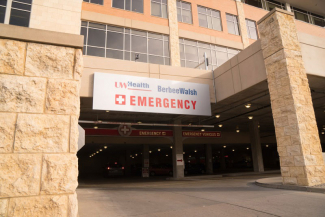
People with dementia are twice as likely to seek emergency care compared to older adults who don’t have dementia. The emergency department can be a loud, bright, fast-paced environment, which can amplify cognitive issues and present communication challenges for someone with dementia. But there are steps you can take to improve an emergency department visit for someone with Alzheimer’s disease or another cause of dementia.
Manish Shah, MD, MPH, is an emergency department physician and researcher with the BerbeeWalsh Department of Emergency Medicine at the University of Wisconsin School of Medicine and Public Health. He is an expert in improving emergency care for geriatric patients and people with dementia. Dr. Shah has shared six tips to help people with dementia and their caregivers prepare and plan for an emergency department visit.
These tips were shared in a recent episode of Dementia Matters. Listen to the podcast “Emergency Care Tips for People with Dementia" to learn more.
1. Be prepared
Develop a two-part emergency department visit plan that is ready long before an emergency visit is necessary. The first part of this plan should be discussion about chronic health issues and what's important to you or your loved one from the standpoint of health and goals of care. The second part should include a folder of helpful documents that you can take with you to an emergency department visit. The folder should include a list of medical problems and surgeries, an up-to-date medication list, your primary care and specialists’ phone numbers (including after-hours numbers), advanced directives, and anything else that might help emergency department staff understand care for you or your loved one.
2. Inform emergency department staff that the person has dementia
When you arrive at the emergency department, inform staff that you or the person you are accompanying has dementia or memory issues. Ask the staff member to record this information in the medical record. It will help healthcare providers understand how they should approach and proceed with communication and care. If the patient has an activated health care power of attorney (HC-POA), have that document ready and tell the emergency department staff. If you are the primary person on the HC-POA, let the staff know that too.
3. Be patient
There is no time of day that is best for visiting the emergency department. Emergency departments are equipped to handle all patients but prioritize the most life-threatening situations first. Visit the emergency department whenever you feel you may need to, and do not let the wait times discourage you from visiting.
Even with the priority access to testing emergency department patients get, it takes a couple of hours for diagnostic testing, such as blood tests, X-rays, and CT scans, and interventions, such as medications. It is important to be prepared for a possibly lengthy visit. Bring items that will help you or the patient be comfortable in that environment. That might include reading glasses, hearing aids, or a comfortable sweater or blanket. It could also include reading materials, headphones and music, or a device on which to watch television programs or movies. If you bring medications, snacks or beverages to the emergency department, always ask staff before eating or drinking anything or taking medications to ensure it will not interfere with any planned tests or treatments. Let the emergency department staff know if you need something; they don’t want you getting dehydrated or missing a medication either.
4. Monitor suspected health concerns, and be proactive
There are instances when an emergency department visit is necessary. Older adults, particularly people with dementia or chronic illnesses, can get sick quickly. Other times, health changes occur slowly or offer early warning signs. Don’t ignore the warning signs. If a health issue is concerning you but has not reached a point where immediate care is necessary, call your primary care physician. In many instances, a primary care physician can intervene before the condition develops into an emergency, saving you a trip to the emergency department and even a hospital admission.
5. Learn about dementia
Familiarize yourself with dementia, the various stages of the disease and the disease process so that when medical issues arise or changes occur, you know what to expect and how to approach them. An example of this might be behavioral changes or difficulty swallowing, eating, and drinking.
6. Consider telemedicine
As the COVID-19 pandemic has affected almost all forms of care, telemedicine visits have become more widely available. Telemedicine visits can be helpful in treating a person’s illness without an emergency department visit. However, for individuals with memory loss these visits can be more challenging. It is best to have a caregiver to assist the person with dementia with the visit to ensure all issues are thoroughly addressed. Get tips for optimizing telemedicine visits in the Dementia Matters episode "The Ins and Outs of Telemedicine: Quick Tips for Patients."
- Log in to post comments



